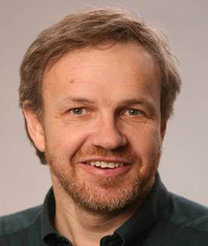Winfried Denk to receive the Kavli Prize for Neuroscience

Winfried Denk is well known for his pioneering work on the development of imaging methods. His share of the Kavli Prize is being awarded for two of these, which aid in answering key questions about how information is transferred from the eye to the brain.
Denk introduced the method of 2-photon microscopy in 1990. This technique is much less harmful to the tissue investigated than the confocal laser scanning microscopy that had been used previously. It allowed observations to be made deep within opaque tissues and over longer periods of time. The microscope increased the penetration from 50-80 μm to up to 1000 μm (1 mm); regions of the tissue that had previously been unreachable were thus made visible.
In subsequent years Winfried Denk developed a 3-D raster electron microscope, allowing the tiniest details of tissue structure to be imaged in three dimensions. The surface of a block of tissue is scanned by an electron microscope and the image stored electronically. A thin layer is then removed, and the newly exposed surface is scanned in the same way. The procedure is repeated thousands of times, and the series of images combined by computer to form a 3D image of the entire block.
Both of Denk's methods have revolutionized research involving imaging methods. They lead to completely new insights into local structures and processes within tissues. Only in this way can many biological processes be understood.
Winfried Denk studied physics at the Ludwig Maximilians University in Munich and later at the ETH in Zurich. He earned his PhD at Cornell University, Ithaca, USA, and did research at the IBM Research Lab in Rüschlikon in Switzerland, before forming his own research group at the Bell Laboratories in Murray Hill, N.J., USA. In 1999 he became a director at the Max Planck Institute for medical Research in Heidelberg and leader of the Dept. of Biomedical Optics there. He has been an Honorary Professor at Heidelberg University since 2002. In 2014 he will move to the MPI for Neurobiology at Martinsried, where he will lead the Dept. of Structural Neurobiology.
The Kavli Prize honours scientists for pioneering work in Astrophysics, Nanoscience and Neurobiology. The Prize was inaugurated by Fred Kavli, a Norwegian, and is endowed with one million US dollars. The award ceremony is held in Oslo. The prize has been awarded every two years since 2008, by a partnership including the Norwegian Academy of Science and Letters, the Kavli Foundation, and the Norwegian Ministry of Education and Research.
SM/HR
